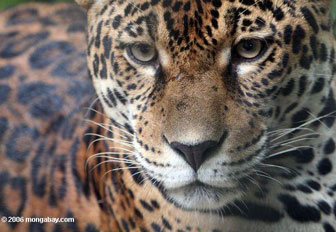Congress urged to protect big cats, endangered dogs
Congress urged to protect big cats, endangered dogs
Wildlife Conservation Society
September 7, 2007
Efforts to protect many of the world’s largest and most endangered wild relatives of cats and dogs recently moved a step closer to victory with a congressional hearing on the “Great Cats and Rare Canids” bill. Today’s hearing was the first since the bill’s introduction in 2004, according to the Wildlife Conservation Society and other environmental groups which support this legislative initiative.
The bill—listed as H.R. 1464—identifies seven felid and six canid species recognized as endangered or threatened under international treaties and U.S. law. These include many well-known species, such as the lion, leopard, cheetah, and jaguar. But also included in the bill are some less known carnivores including: the Iberian lynx; the African wild dog; the dhole, a rare species of wild dog native to southern Asia; and the Ethiopian wolf, the world’s rarest canid found only in Ethiopia’s highlands.
“Charismatic species like lions, cheetahs, Ethiopian wolves, African wild dogs and the nine other species mentioned in the bill are culturally important, iconic and inspiring wild animals,” said Dr. Joshua Ginsberg, Vice President for Conservation Operations of the Wildlife Conservation Society’s Global Conservation Program, who testified in support of the bill before the House Committee on Natural Resources. “Their loss would be a diminution of our biological richness, our natural heritage, and our own spirits.”

Jaguar in Colombia How to save the world’s big cats Big cats are some of Earth’s largest and most threatened predators. Long persecuted as perceived threats to livestock and humans, hunted for their skins and purported medicinal values, and losing critical habitat to deforestation and conversion for agriculture, big cat populations have dwindled around the world for the past century. Recent years have seen the extinction of two sub-species of Indonesian tiger, the Caspian Tiger from western Central Asia, a sub-species of clouded leopard from Taiwan, and the Barbary lion from the wild in North Africa. Meanwhile, populations of the Iberian lynx, Asiatic cheetah and Amur leopard have fallen so low that they would be functionally extinct without current conservation efforts. Tiger populations have declined from more than 100,000 at the turn of the century to less than 6,000 today, while cheetah number are estimated at less than 15,000. Even lion populations have dropped: from over 100,000 one hundred years ago to probably less than 40,000 today. |
Besides the Wildlife Conservation Society, other groups supporting the bill include the Defenders of Wildlife, the African Wildlife Foundation, the Association of Zoos and Aquariums, Conservation International, The Nature Conservancy, Safari Club International, and World Wildlife Fund.
The legislation will create a new fund for the conservation of these species similar to the already existing Multinational Species Conservation Funds. The act would provide funds for such conservation activities as research, monitoring, planning, training, and conservation education. An identical companion bill—S. 1033—has already been introduced in the Senate, which still awaits consideration by the Senate Environment and Public Works Committee before the bill can be enacted.
Many of the wild dog species in particular are critically endangered and in need of funding for conservation planning.
The “Great Cats and Rare Canids Act” was introduced by co-chairs of the International Conservation Caucus—which currently includes Tom Udall (D-NM), John Tanner (D-TN), Ed Royce (R-CA), and Hal Rogers (R-KY)—in an effort to provide financial resources for international efforts to conserve these large carnivores and the wild lands where they exist. Like the Multinational Species Conservation Funds that support the conservation of rhinos, tigers, great apes, elephants, and sea turtles, this new fund has the potential to leverage $3 for every $1 of U.S. Government support. Such successful leveraging is made possible by public private partnerships between conservation organizations like the Wildlife Conservation Society, foreign governments, academic institutions and private organizations.
“In addition to support from the U.S. Government, the Great Cats and Rare Canids’ bill has the potential to stimulate further support from the private and philanthropic community as well as the international community,” said John Calvelli, Senior Vice President of the Wildlife Conservation Society’s Public Affairs Division. “We encourage Congress to continue the tradition of building international alliances for the benefit of saving some of the world’s most charismatic predators.”
Urge Congress to support the Great Cats and Rare Canids Act













